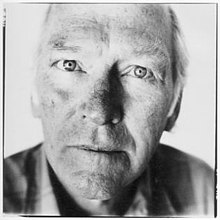Donald Davidson (philosopher)
| Donald Davidson | |
|---|---|

Portrait by photographer Steve Pyke in 1990.
|
|
| Born |
Donald Herbert Davidson 6 March 1917 Springfield, Massachusetts |
| Died | 30 August 2003 (aged 86) Berkeley, California |
| Alma mater | Harvard University |
| Era | 20th-century philosophy |
| Region | Western Philosophy |
| School | Analytic |
|
Main interests
|
Philosophy of language, Philosophy of action, Philosophy of mind, Epistemology, Events |
|
Notable ideas
|
Radical interpretation, anomalous monism, truth-conditional semantics, principle of charity, slingshot argument, reasons as causes, understanding as translation, swampman, Davidson's argument against alternative conceptual schemes (the third dogma of empiricism) |
|
Influences
|
|
|
Influenced
|
|
Donald Herbert Davidson (March 6, 1917 – August 30, 2003) was an American philosopher. He served as Slusser Professor of Philosophy at the University of California, Berkeley from 1981 to 2003 after having also held teaching appointments at Stanford University, Rockefeller University, Princeton University, and the University of Chicago. Davidson was known for his charismatic personality and the depth and difficulty of his thought. His work exerted considerable influence in many areas of philosophy from the 1960s onward, particularly in philosophy of mind, philosophy of language, and action theory. While Davidson was an analytic philosopher, and most of his influence lies in that tradition, his work has attracted attention in continental philosophy as well, particularly in literary theory and related areas.
Although published mostly in the form of short, terse essays that do not explicitly rely on any overriding theory, his work is nonetheless noted for a highly unified character, the same methods and ideas brought to bear on a host of apparently unrelated problems, and for synthesizing the work of a great number of other philosophers. He developed an influential truth-conditional semantics, attacked the idea of mental events as governed by strict psychological laws, and rejected the conception of linguistic understanding as having to do with conventions or rules, concluding famously that "there is no such thing as a language, not if a language is anything like what many philosophers and linguists have supposed. There is therefore no such thing to be learned, mastered, or born with." His philosophical work, as a whole, is said to be concerned with how human beings communicate and interact with one another.
Davidson was born in Springfield, Massachusetts on March 6, 1917, to Clarence ("Davie") Herbert Davidson and Grace Cordelia Anthony. The family lived in the Philippines from shortly after Davidson's birth until he was about 4. Then, having lived in Amherst and Philadelphia, the family finally settled on Staten Island when Davidson was 9 or 10. He then began to attend public school and had to begin in first grade with much younger children. He then attended the Staten Island Academy, starting in fourth grade.
...
Wikipedia
